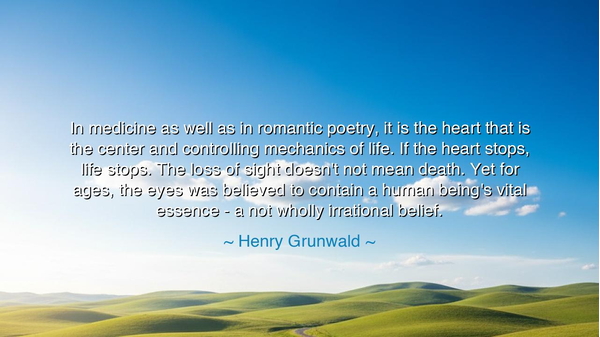
In medicine as well as in romantic poetry, it is the heart that
In medicine as well as in romantic poetry, it is the heart that is the center and controlling mechanics of life. If the heart stops, life stops. The loss of sight doesn't not mean death. Yet for ages, the eyes was believed to contain a human being's vital essence - a not wholly irrational belief.






The words of Henry Grunwald—“In medicine as well as in romantic poetry, it is the heart that is the center and controlling mechanics of life. If the heart stops, life stops. The loss of sight does not mean death. Yet for ages, the eyes were believed to contain a human being’s vital essence—a not wholly irrational belief”—speak with both science and poetry, reason and myth. In them, we see a union of two great streams of human thought: the clinical precision of medicine and the symbolic power of romantic poetry. He reminds us that the heart is not only a pump of blood but a throne of spirit, and that the eyes, though not essential for survival, were long revered as the mirrors of the soul.
The origin of this belief reaches into the oldest traditions of humankind. Ancient Egyptians preserved the heart in sacred canopic jars, believing it would be weighed in the afterlife against the feather of truth. In Chinese medicine, the heart was seen as the seat of the Shen—the spirit. Meanwhile, across the world, poets and sages turned to the eyes as symbols of truth and intimacy. “The eyes are the window to the soul,” proclaimed many, for in the gaze of another we seem to glimpse more than flesh; we sense the hidden self. Grunwald reconciles these truths: the heart as the biological engine of life, and the eyes as the mystical portal of essence.
Consider the example of Helen Keller. Born into silence and darkness, cut off from the sight and sound that others believed to be essential, she yet lived, thought, created, and inspired. Her heart carried her onward, her spirit reaching out through touch and words. Her story illustrates Grunwald’s wisdom: the loss of sight is not the loss of being; life endures so long as the heart continues to beat. And yet, her triumph also shows why eyes were long considered sacred—for when we look into another’s gaze, we commune in ways that words can never capture.
The ancients were not wholly wrong in exalting the eyes. In battle, in love, in trust, the gaze often speaks before the mouth. A commander’s eyes can rally soldiers. A lover’s glance can kindle fire. A betrayer’s eyes may avert themselves, revealing guilt. The eyes, though not vital in the medical sense, carry a power beyond the flesh. This is why myth and poetry exalted them, even while the heart, unseen and silent, carried the true mechanics of survival.
The lesson for us is twofold. First, honor the heart, for it is the wellspring of life—guard it with care, in body and in spirit. Live in such a way that your heart is not consumed by bitterness or poisoned by neglect. Second, honor the eyes, not as vessels of life itself, but as vessels of connection. Look into the eyes of those you love, of those you meet, and remember that in that shared gaze lies recognition, trust, and the mystery of being.
Practically, this means living with balance between reason and poetry. Care for the physical heart: exercise, nourish, protect it. But also tend to the symbolic heart: cultivate kindness, compassion, and courage. Likewise, do not worship beauty of the eyes alone, but recognize their role in expressing the deeper truths of the soul. Look honestly, and let your gaze be a channel of truth and love, not of deceit.
Thus, Grunwald’s words become more than observation; they are a bridge between the material and the spiritual. The heart is the throne of life; the eyes are the heralds of the soul. Together, they remind us that man is both flesh and spirit, science and poetry, survival and meaning.
So let this truth be passed to future generations: treasure your heart, for it keeps you alive; treasure your eyes, for they reveal who you are. To live wisely is to care for both—the mechanics of life and the mystery of essence—so that in body and in spirit, you may endure and shine.






AAdministratorAdministrator
Welcome, honored guests. Please leave a comment, we will respond soon